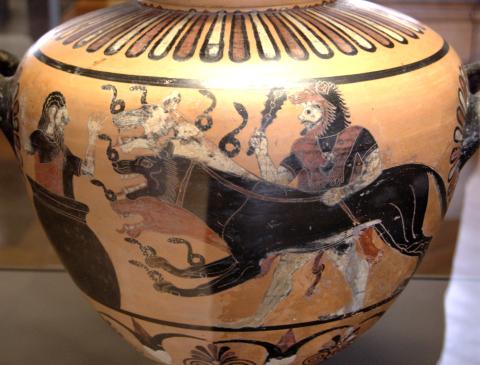Post haec avārī Dītis appāret domus.
hīc saevus umbrās territat Stygius canis,
quī trīna vastō capita concutiēns sonō
rēgnum tuētur. sordidum tābō caput785
lambunt colubrae, vīperīs horrent iubae
longusque tortā sībilat caudā dracō.
pār īra fōrmae: sēnsit ut mōtūs pedum,
attollit hirtās angue vibrātō comās
missumque captat aure subrēctā sonum,790
sentīre et umbrās solitus. ut propior stetit
Iove nātus antrō, sēdit incertus canis
et uterque timuit. — ecce lātrātū gravī
loca mūta terret; sībilat tōtōs mināx
serpēns per armōs. vōcis horrendae fragor795
per ōra missus terna fēlīcēs quoque
exterret umbrās. solvit ā laevā ferōs
tunc ipse rictūs et Cleōnaeum caput
oppōnit ac sē tegmine ingentī tegit;
victrīce magnum dexterā rōbur gerēns800
hūc nunc et illūc verbere assiduō rotat,
ingeminat ictūs. domitus īnfrēgit minās
et cūncta lassus capita summīsit canis
antrōque tōtō cessit. extimuit sedēns
uterque soliō dominus et dūcī iubet;805
mē quoque petentī mūnus Alcīdae dedit.
Notes
Theseus describes how he and Hercules arrived at Dis’s palace, and Hercules tamed Cerberus.
The passage elaborates on Virgil, Aeneid 6.417–425.
782: avārī: Dis is “greedy” because he takes and keeps all souls.
784 sonō: ablative of manner (AG 412)
785 tabō: “in its putrid gore,” ablative of specification (AG 418)
787 dracō: ancient representations of Cerberus often show his body covered in snakes, such as a sixth-century hydria now in the Louvre.
788 pār īra fōrmae: supply est: “his anger matches his appearance.” motūs: accusative noun, not a participle.
789 vibrātō: “quivering.” The chiastic arrangement of nouns and adjectives suggests how the snakes are embedded in the dog’s mane.
790 aure: ablative of means (AG 408)
791 et = etiam, “even”
792 antrō: dative with propior (AG 383)
793 uterque: both Cerberus and Hercules. latratū gravī: ablative of means (AG 408)
795 armōs: referring to the whole side of the animal (LS armus II), a poetic and Vergilian usage.
796–97 felicēs quoque … umbrās: i.e., the shades in the Elysian Fields, far off from Cerberus’ lair. solvit: “loosened,” “took off,” or “removed.” ā laevā: “from his left shoulder”
798 Cleonaeum caput: the head of the Nemean Lion, a typical part of Hercules’ attire, as on the Louvre hydria.
799 oppōnit: “thrust out” (Fitch 2018). tegmine, dexterā: ablatives of instrument (AG 409).
801 verbere: ablative of manner (AG 412)
802 īnfrēgit: “checked,” i.e. stopped (LS infringo II)
804 antrōque tōtō cessit: “he emerged from the whole cave,” suggesting Cerberus’ immense size. Fitch (2018) translates, “emerged from the cave that it filled.”
805 uterque … dominus: Dis and his wife Proserpina. They are often depicted sitting together as rulers of the Underworld, as on an Apulian volute krater (ca. 320 BC) now in the Kiel Antikensammlung. soliō: locative ablative (AG 426). dūcī iubet: “ordered (Cerberus) to be led away.” The subject is uterque dominus.
806 petentī … Alcidae: dative. Theseus and Pirithous had been held captive in the Underworld after attempting to abduct Proserpina. Hercules receives the captive Theseus as a gift (LS munus II.C).
Vocabulary
avārus –a –um: greedy
Dīs –ītis m.: Dis; Pluto
territō territāre territāvī territātus: to fill with alarm; affright
Stygius –a –um: Stygian; pertaining to Styx (river)
ternī –ae –a: 3 each
vāstus –a –um: empty, desolate; vast
concutiō –ere –cutere –cussī –cussum: to shake; strike
sonus sonī m.: sound
tueor tuērī tūtus sum: to look at
sordidus –a –um: dirty; poor, humble, lowly
tābum –ī n.: putrid blood; pus
lambō –ere –ī –itus: to lick
colubra –ae f.: a female serpent
vīpera –ae f.: a viper
horreō horrēre horruī: to shake, dread
iuba –ae f.: the mane of a horse; of a serpent
torqueō torquēre torsī tortum: to twist
sībilō sībilāre sībilāvī sībilātus: to hiss
cauda –ae f.: the tail, coda
dracō –ōnis m.: dragon, serpent
mōtus mōtūs m.: motion, movement
attollō attollere: to raise up, lift up
hirtus –a –um: hairy
vibrō vibrāre vibrāvī vibrātus: to shake
captō captāre captāvī captātus: to seize
sonus sonī m.: sound
propior propius; proximus –a –um: nearer; nearest
Iuppiter Iovis m.: Jupiter, Jove
antrum –ī n.: cave
incertus –a –um: uncertain
lātrātus –ūs m.: barking; baying
mūtus –a –um: inarticulate, silent
sībilō sībilāre sībilāvī sībilātus: to hiss
mināx –ācis: threatening
serpēns –entis (gen. pl. serpentum) m./f.: snake
armus –ī m.: the shoulder
horreō horrēre horruī: to shake, dread
ternī –ae –a: 3 each
exterreō –ēre –uī –itus: to frighten; alarm
laeva –ae f. (sc. manus): the left hand
rictus –ūs m.: an open mouth, gaping jaws
Cleonaeus -a - um: of Cleonaeus; Cleonaean
oppōnō oppōnere opposuī oppositum: to set before, against; oppose
tegmen (tegumen) –inis n.: means of covering; skin
victrīx –cis: victorious, triumphant
rōbur rōboris n.: oak, strength
illic illaec illuc: pron., that person or thing
verber –eris n.: whip, lash; a beating
assiduus –a –um: established, steady
rotō rotāre rotāvī rotātus: to move like a wheel; whirl about
ingeminō ingemināre ingemināvī ingeminātus: to repeat
domō domāre domuī domitus: to tame, subdue
īnfringō –ere –frēgī –frāctus: to break in; break
minae –ārum f. pl.: battlements, threats
lassus –a –um: tired, weary
submittō submittere submīsī submissum: to place under
antrum –ī n.: cave
extimēscō –ere –timuī: to be afraid
solium –iī n.: seat; throne
dominus dominī m.: master, lord
Alcīdēs –ae. m.: a descendant of Alceus; Hercules

